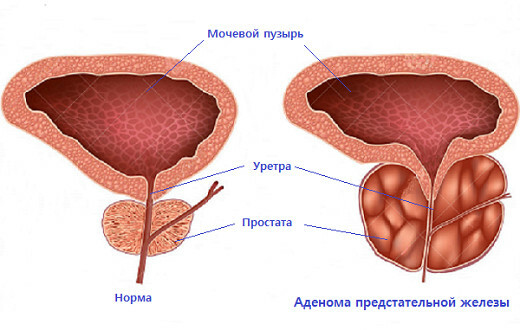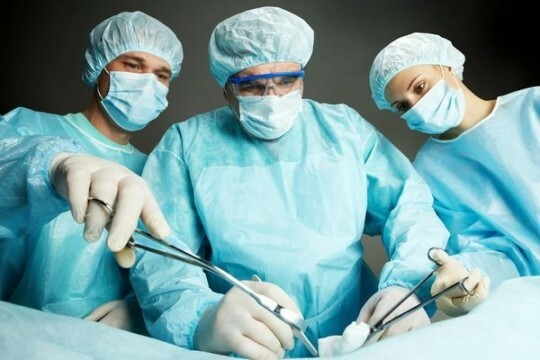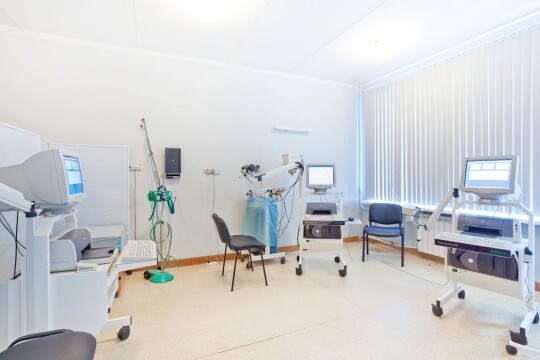The prostate gland( prostate) is a very vulnerable part of the male body, susceptible to several diseases that threaten health. Treatment of ailment can be both medicamental and operative.
The operative method of treatment means the complete or partial removal of the prostate gland. This method can be prescribed by a doctor both in adenoma and in oncology of the prostate gland.
Diseases of the prostate

Prostate adenoma is an outdated name for a disease such as prostatic hyperplasia of a benign nature. For the disease characterized by the formation of one or more nodules, increasing over time in size. According to statistics, adenoma is considered to be one of the most common diseases among men after 45-50 years.
Any benign disease can develop into a malignant tumor. An indicator of the presence of prostate adenoma will be detected in the diagnosis produced by cells of the glandular tissue of the PSA( prostatic specific antigen).
Often, representatives of the male face with oncology of a particular stage. PSA, produced by cells of the glandular tissue, can also be an indicator of prostate cancer.
Cancer tumor removal is a more serious case than the above. In addition to surgery, patients will be prescribed therapy, applied in oncology. Special therapy also depends on the stage of cancer. Basically, after complete or partial removal of the prostate, one of the following postoperative recovery options is prescribed:
- radiotherapy;
- chemotherapy;
- hormone therapy.
Methods of surgical intervention
There are several common disposal methods used in surgery:
- Induction. By penetrating the urethra on the glandular tissue, an incision is made in the vertical arrangement, by which the lumen is enlarged. Transurethral resection of the prostate. By excision of a small part of the glandular tissue, a special instrument is inserted, also through the urethra.
- Radical prostatectomy. The main method of treatment, during which the removal of not only the glandular tissue, but also its capsules, seminal vesicles, ileal lymph nodes( at the discretion of the doctor).Indications are tumors that do not yet have metastases. In a more neglected case, treatment can only be palliative. The process is under general anesthesia, to avoid complications, there are contraindications:
- age after 70 years;
- cardiovascular disease;
- acute inflammatory( infectious) diseases.
Complications of

Despite the fact that surgery to remove the prostate gland in the case of cancer or part of it in cases of prostate adenoma is technologically high, complications for patients can still arise.
- Sclerosis of the neck of the bladder;
- The presence of PSA in the blood. In prostate cancer, there is a stable increase in PSA in the blood of a man, so diagnosis when referring to a medical institution is considered primary.
- General complications in the postoperative period: inflammation, weakness, suppuration , etc.
- Urine retention. occurs as often as incontinence. The reason for urine retention can be anything, from blood clots left after surgery to physiological changes in the canal. The consequences of such complications are unsafe for men. It can be puffiness, renal failure of an acute nature, inflammation of the urinary or kidneys, the secretion of blood in the urine.
- Leakage, incontinence. 10-12% of patients after surgery may notice involuntary leakage, urinary incontinence is sometimes the cause of the complication in that the glandular tissue is not removed to the end. Most likely, incontinence treatment will not help here, repeated surgery will be the right decision. Urinary incontinence in principle - will be a clear signal for urgent treatment in a medical institution.
- Inflammatory process. May occur both because of infections, and because of the individual reaction of the body. Symptoms will be pain, temperature, chills, purulent discharge, odor. The doctor will prescribe the correct treatment.
- Pain syndrome. Almost every person will experience pain after surgery - this is a rule that lasts about 7-10 days. But in cases where the pain does not pass, you should see the doctor.
- No sperm or retrograde ejaculation ( full / partial).It is considered a very frequent consequence. In the process, sperm are thrown into the bladder. When you pass the test, it is found in the urine.
- The main consequence of surgical intervention in both cancer and adenoma, which men are so afraid of - violation of the potency of .Fortunately for men, this phenomenon is not the norm and mainly concerns only the late stages of cancer, when it is already not about men's health, but about life in general. Of course, there are exceptions to the rules, but subject to all the recommendations of the doctor, as well as with the correct preparation for an operation, the risk is reduced. The main thing is that when repeated tests in the blood again were not detected PSA.
To more rare complications are:
- sepsis;
- allergic reaction;
- doubts about the complete excision of the tumor.
In the process of any surgical procedure there is a danger of blood loss. The case is far from frequent, but there is still a danger of complication. To correct such a result, the patient is expected to receive blood transfusions.
The consequence of transurethral resection can be water intoxication .This is due to the fact that during the procedure the urethra is irrigated with an antiseptic solution.
Any reaction is not the norm, it is best to immediately consult a doctor. With the removal of tumors in men at an early stage of cancer, the chances to lead a full life for a decade are great .At later stages complications are unavoidable. Especially if PSA is also found in the blood or if there are metastases, the preservation of the physiological functions of the man will be under a profound question. At the last stage of prostate cancer and the germination of metastases into the lymphatic system, it will only go about maintaining the patient's life.



